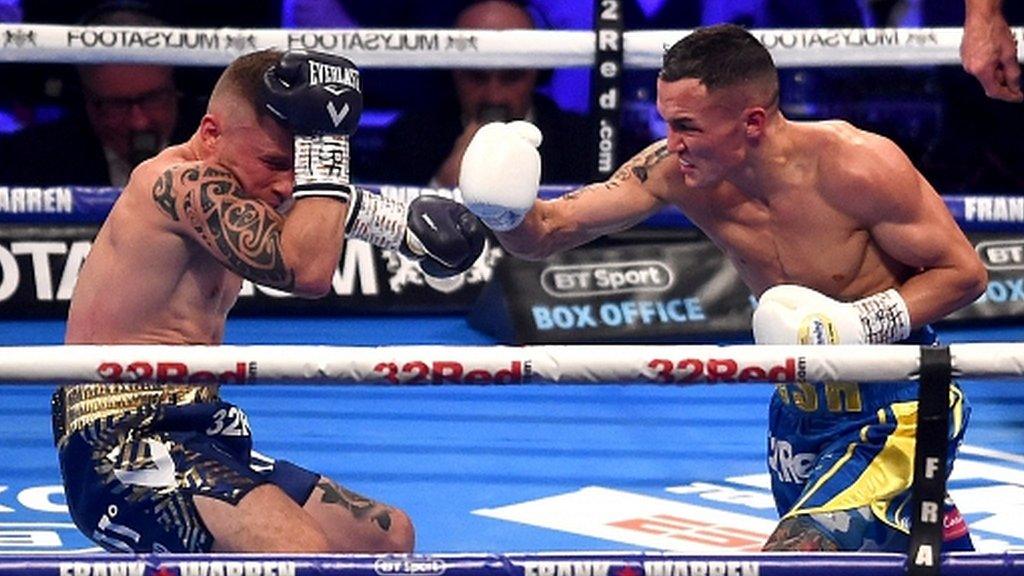George Groves - why British boxer should be proud of his career
- Published
- comments
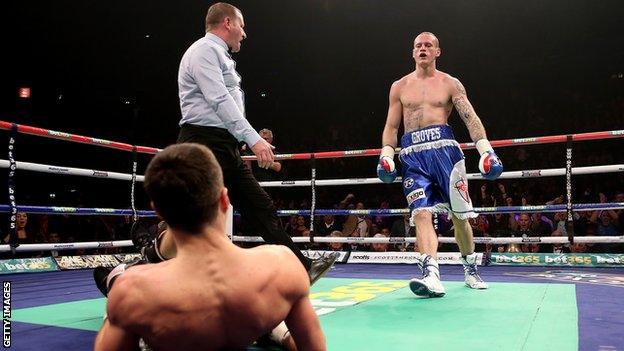
Groves floored Froch inside a round and looked on course for a massive upset when they first met in 2013
Muhammad Ali, Henry Cooper, Frank Bruno, Wladimir Klitschko, Anthony Joshua.
A handful of iconic names have topped a fight card at Wembley Stadium and George Groves will be remembered as one of them.
Defeat on the grandest stage at the hands of Carl Froch in 2014 risks dulling his name on such a list but Groves had no need to include the line "I believe I have been good for boxing" in his retirement statement on Monday.
He has been.
Making the masses tune in
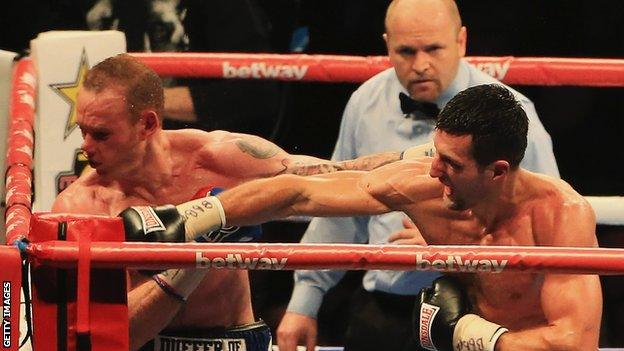
Froch (right) knocked Groves out with a right hand which commentator Mike Costello said was one of the best punches ever in a British ring
The wave British boxing is riding owes much to many: television broadcasters, the London 2012 Olympic springboard, polished promoters, social media, Joshua's class, Tyson Fury's charisma and a world-renowned GB Boxing amateur set-up churning out talent.
They can all claim impact - but we should add Groves to that list, too.
The Londoner - just 25 at the time - played villain in cultivating a rivalry with Carl Froch in 2013, yet left Manchester Arena to cheers having won countless fans in a gallant and controversial defeat.
Before both of his fights with Froch, Groves helped to develop the frenzied, almost stratospheric interest by going out of his way to get under his opponent's skin with both his barbs and his behaviour.
When Froch claimed his champion status was not being respected, Groves upped the ante - labelling his rival "insecure"., external
Groves - who had dabbled in stand-up comedy earlier in his life - took to playing with a Rubik's cube while his rival spoke at a news conference. He was dubbed childish, arrogant and rude by Froch.
And the image of Groves stood over a floored Froch inside a round screamed of the arrogance and self belief he had exuded in stoking the animosity, which ultimately paved the way for a rematch.
Lip service was paid by those who rarely looked in boxing's direction, so much so that 80,000 turned out to see the pair lock horns again at Wembley Stadium - a venue the sport had not needed since Bruno claimed a world title against Oliver McCall in 1995.
The relentless ticket sales and stadium nights that follow Joshua have spoiled fight fans in recent years to the extent it can be forgotten that Groves - and indeed Froch - ended 19 years of wait for a night of such domestic stardust.
With such a moment comes new fans, a wave of new ticket buyers for future fights and bundles of fresh cash for the pay-per-view market in years to come. Groves more than played his part in delivering a welcome jolt for boxing's street cred, a role which should not be forgotten.
The rewards of persistence
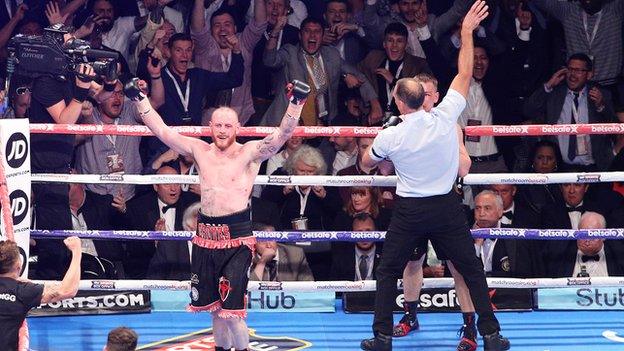
Groves won a world title after a hard-hitting affair against Russia's Fedor Chudinov
Groves' ability - in and out of the ring - to make that Wembley night should be remembered, but the outcome should not define his lifetime's work.
BBC Sport commentator Mike Costello said at the time that Groves was on the end of "the best punch you will ever see in a British boxing ring". A fighter is exposed when stricken on the canvas, more so when a national stadium plays host.
Social media made for a a mocking ground and Groves - briefly - struggled to recover. A fighter's spirit can disappear in one night. Thankfully, he rediscovered his.
For while Joshua - who boxed on the undercard of the Wembley event - was becoming UK boxing's marquee name, Groves suffered more world title heartache at the hands of Badou Jack and was forced to rebuild.
The media sound bytes which lit up his Froch build-up disappeared. By his own admission he had expended too much of himself talking before big fights, perhaps at the cost of results.
And while fans owe a debt of gratitude for the momentum his Froch rivalry built, fighters can look to Groves as a shining example of the fruits of perseverance.
Watching his fourth world title tilt against Fedor Chudinov from ringside in 2017 was tough on the eyes, such was the brutal punching both served up.
Afterwards, he sat in a news conference at Sheffield United's Bramall Lane stadium limp, numb and almost vacant - his relief obvious.
At last he had delivered, unsurprising then he asked Costello for a recording of the fight commentary, later revealing he listened to it while running. Such nights and memories are hard to come by.
Groves has been down, cut, beaten and written off. Despite the setbacks he offered hope in an era where defeat is sometimes treated as a boxing sin with an insurmountable penance.
Grounded by memories and tragedy
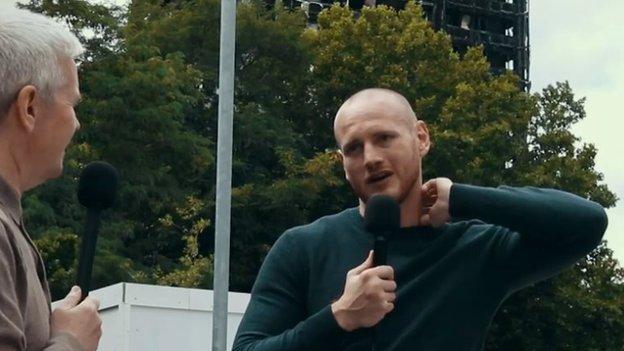
Groves visited Grenfell Tower with BBC Radio 5 live having started boxing there
Reaching the top of the mountain has been known to drag some from their roots but Groves was hauled back to memories of where his journey began just two weeks after his Chudinov win.
The Dale Youth Boxing Club where he worked on his craft as a child - and who he later won two English amateur titles for - was located in Grenfell Tower, the west London residential tower block where a tragic fire killed 72 people 18 days after his world title victory.
He had visited the gym with his belt just days before the fire and returned to the site with BBC Radio 5 live in the aftermath, admitting he was "clueless" as to how to help.
Dale Youth continued to operate for its countless junior members in a disused car park until it was re-housed with the help of BBC One's DIY SOS programme. Groves was there at the launch of the new club, giving back to a community in need; one which had helped shape him.
Such proximity to darkness - and the life-changing injuries Germany's Eduard Gutknecht suffered at his hands in 2016 - put world titles, rivalries and pay-per-view sales in context.
In shunning more pay days and retiring to focus on family and new ventures, Groves sees the bigger picture.
But from his goading of Froch to his climb back to the top, he always did.
Some may question his timing - he is, after all, only 30 and his last appearance in a ring ended in defeat to Callum Smith.
But in more ways than one Groves has already left his legacy and, yes, George... you have been good for boxing.
- Published22 December 2018
